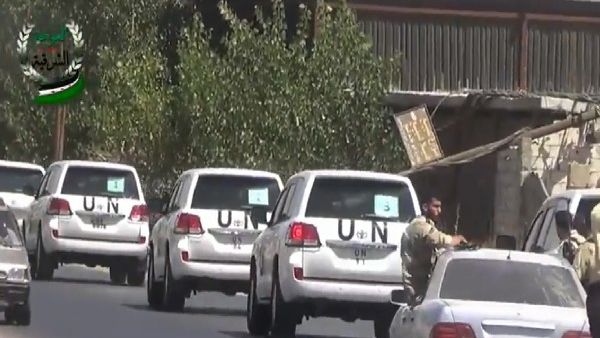U.N. Security Council held an emergency meeting on Wednesday to discuss a British drafter resolution that could authorize military action against Syria in response to the use of chemical weapons there.
Envoys from veto-wielding permanent members and Britain, China, France, Russia and the United States started talks behind closed doors amid reports that Russia is likely to oppose the draft resolution, Al Arabiya correspondent in New York Talal Alhaj reported.
The draft resolution is being considered under Chapter 7 of the U.N. Security Council, which states that the council “may take such action by air, sea, or land forces as may be necessary to maintain or restore international peace and security.”
“Such action may include demonstrations, blockade, and other operations by air, sea, or land forces of Members of the United Nations,” Chapter 7 states.
Russia fiercely opposes giving U.N. backing to what it considers Western moves to oust Assad. Russia and China have already vetoed three resolutions that would have stepped up pressure on Assad without imposing sanctions.
Russia has said the Council should wait for U.N. chemical weapons inspectors to finish their inquiry in Syria before deciding any action. U.N leader Ban Ki-moon said Wednesday that the inspectors need four more days to finish their work.
The U.N.-Arab League special envoy for Syria said Wednesday that international military action in the country cannot go ahead without approval by the U.N. Security Council.
"I think international law is clear on this. International law says that military action must be taken after a decision by the Security Council," Lakhdar Brahimi told reporters in Geneva.
Syrian response
Syrian Prime Minister Wael al-Halqi said Wednesday that Syria will turn into a "graveyard of the invaders" in case of foreign military intervention and accused the West of inventing pretexts to attack, AFP reported.
Syria will "surprise the aggressors as it surprised them in" the 1973 Yom Kippur war, when Arab forces caught Israel off guard, and become "the graveyard of the invaders," he said.
The "colonialist threats" of Western powers "do not terrorize us because of the will and determination of the Syrian people, who will not accept being humiliated," Halqi said, quoted on state television.
Israel prepares
Israel ordered a small-scale mobilization of reservists on Wednesday and strengthened its missile defenses as precautions against possible Syrian attack should Western powers carry out threatened strikes on Syria, according to Reuters.
But an Israeli official briefed on a meeting of Prime Minister Benjamin Netanyahu's security cabinet said Israel believed the probability of it be targeted by Syria, its northern neighbor and long-time foe, was low.
"Following a security assessment held today, there is no reason for a change to normal routines," Netanyahu said in a statement. "We are, in parallel, preparing for any scenario."
That included a limited call-up of military reserve soldiers and deployment of an advanced missile shield in the north, the official said. Israel Radio said mobilization of several hundred troops in intelligence and air defense had been authorized.
Army Radio reported the military was using all of its missile defenses, which include the short-range Iron Dome, the mid-range Patriot and the long-range Arrow II.








